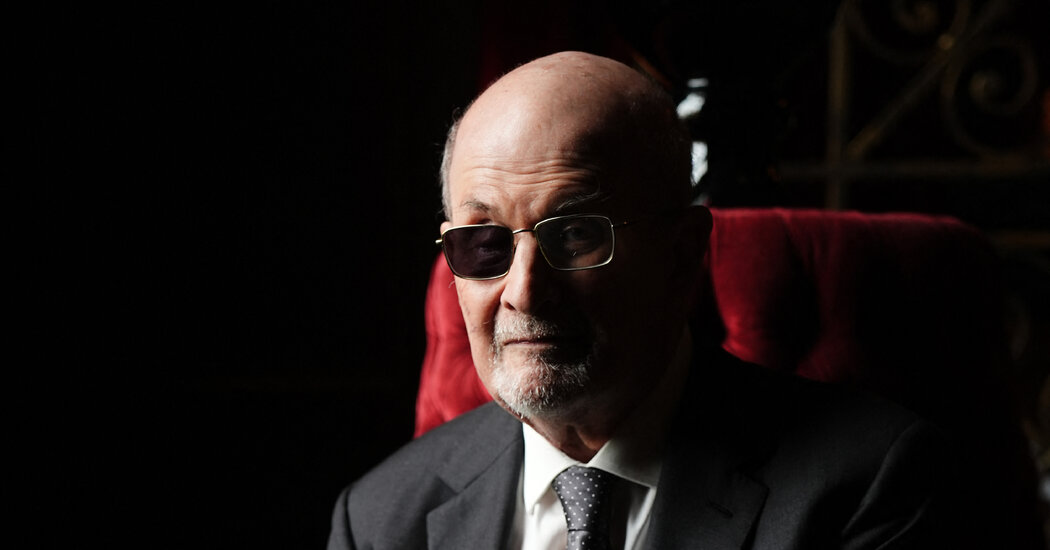THE ELEVENTH HOUR: A Quintet of Stories, by Salman Rushdie
Mortality is on Salman Rushdie’s mind. And who can blame him? After living under an Iranian fatwa for three-plus decades, he survived an early case of Covid-19 only to be almost murdered by a knife-wielding assailant before a live audience in Chautauqua, N.Y., in 2022.
“That is no country for old men,” W.B. Yeats wrote of Ireland almost a century ago in “Sailing to Byzantium.” And America even less so now, with Social Security and Medicare imperiled, but Rushdie, 78, in recent years had been rather sailing to Balthazar, piling up comely ex-wives like a Hollywood director. Meanwhile, the novels were getting flabby.
Following “Knife,” his memoir about the attack, “The Eleventh Hour” is a new collection of five stories, short and medium (enough to have chapterettes). Three are new, two previously published. It’s a set of performative calisthenics more strained than satisfying; a meandering constitutional; a shake of the wrist spilling out a bag overpacked with tricks.
The opener, “In the South,” about a friendship between geezers of differing temperaments, is charming enough but musty, lassoed from publication in The New Yorker in 2009. The closer, “The Old Man in the Piazza,” less a story per se than an argument for argument, first appeared in the waning days of the first Trump administration.
In the muddled middle is “Lost,” a campus novella meets “The Sixth Sense” meets “A Christmas Carol” meets Arthurian legend.
A college professor, the Honorary S.M. Arthur, wakes up dead at 61. Well, we’ve all wondered what that’s like. Here it’s envisioned as a pea-soupish “foggy Limbo” — like that of a newborn, suggests a female student marooned on winter break whom the professor manages to haunt.
Arthur had been a literary prodigy, a one-hit-wonder novelist who’d finagled a lifetime residency, encouraged by Evelyn Waugh. But unlike Rushdie, who wandered “lost” into an aged E.M. Forster’s office at Cambridge, he never delivered on his early promise.
He has some beef with the provost, and has left behind an archive of secrets and scraps that he authorizes the student to sort through. Some are fleeting notions, like this:
“Otherland. Land of the Other / Land in which one is
Othered. Motherland without the M. Its opposite.”
Oh, the pain of the emptied notebook, the clever idea unrealized. Let me tell you about my E.L. Doctorow-inspired 21st-century concept musical: “Screen Time.” It opens with a couple in bed, laptops aglow, and … never mind.
But while we’re invoking musicals: A writer’s life, including an umpteenth plagiarism plot this year, is also considered in “Oklahoma,” the penultimate story of the collection. It’s a supposed found manuscript inspired by Kafka and the Hieronymus Bosch painting “The Extraction of the Stone of Madness,” written by one M.A. (short for Mamouli Ajeeb, meaning “Ordinary Strange”).
Calvino, Borges, T.S. Eliot, Lewis Carroll! The references pile up and stories nest within stories and it all becomes impossible to peel apart, like slices of American cheese without the cellophane.
Ajeeb’s mentor, whom he knows as Uncle K., once ordered eight bottles of mineral water at an expensive restaurant and poured them over his shoes in a fit of envy-revenge. He is rumored to have neatly folded his clothes on a beach and walked into the sea in a “vanishing” — but has he? Better go sit on the porch with Auntie K. to sort it out, and, sakes alive, she has a shotgun.
“The Musician of Kahani,” about a piano prodigy born at midnight like characters in Rushdie’s 1981 Booker Prize-winning breakthrough, has a similar opulence, and at least some coherence. But it also contains a few howlers, lines like “Not everything in her garden was rosy, however” and “How to wipe that glummery off of your kisser?”
“Marriage changes things in a relationship,” the narrator ventures of the pianist’s doomed union to a cricket player. “Either they get better or they get worse. What things don’t do is remain the same.”
Which nobody can deny.
In a book that sometimes seems more citation than perspiration, poor old Emily Dickinson goes uncredited and mangled yet again: “The heart wants what it wants, does it not. And sometimes the heart will find a way.”
The heart wants badly to praise this valiant late-career offering from Salman Rushdie: teeming intellect, generous soul, survivor, bon vivant, lover of language (so much that in “Piazza” he makes a whole character of her, sitting at a table). But the brain struggles to find a way.
THE ELEVENTH HOUR: A Quintet of Stories | By Salman Rushdie | Random House | 272 pp. | $29
Alexandra Jacobs is a Times book critic and occasional features writer. She joined The Times in 2010.
The post Rushdie Returns to Fiction, With Mortality on His Mind appeared first on New York Times.




